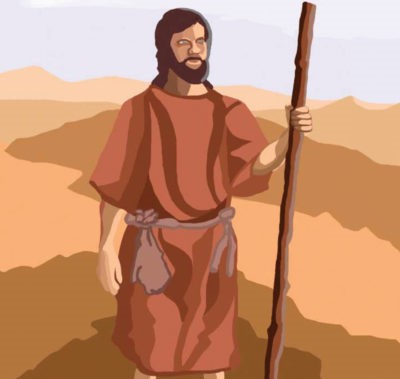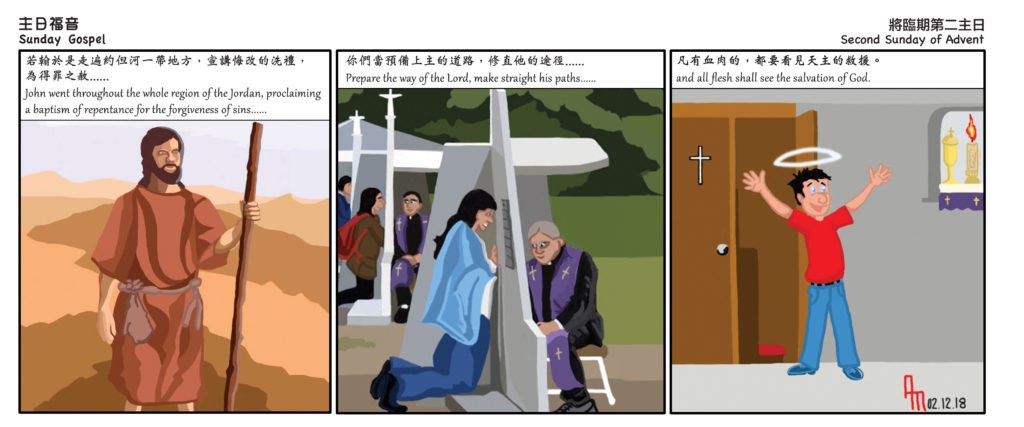Bar 5:1-9, Phil 1:4-6, 8-11, Lk 3:1-6
– May Tam
www.FLL.cc
“The word of God came to John the son of Zechariah in the desert:” what an unlikely opening verse for the preparation of Jesus’ public ministry! Luke had just named all the important people (both political and religious) in that historical period but none of them received the word of God. Why then John, a relatively strange and unknown man, was called to be the herald instead of the emperor, the governor, the tetrarchs or the high priests and why in the desert instead of the more populated Jerusalem or Rome?
John was only made known to us through the promise of the angel to his father Zechariah (Lk 1:5-25), yet he stood as a pivotal figure – the hinge on which the age of the law and prophets was closing and a new era of grace and redemption was about to begin. Likewise, though it was the least favorable place to evangelize, the wilderness was a place of transformation, a place of shelter from the world’s allurements. Indeed God prefers to “bring down the powerful and lift up the lowly” (Lk 1:52). He chose David, a young lad to be the King of Israel and Mary, a lowly maiden to be the Mother of God. He chose a manger to be His birth place, a cross as a saving instrument and His earthly ministry began in Galilee, a Gentile territory (Mt 4:12-25).
The core of John’s cry was for people to repent and to reform their lives. Do I, as a baptized Christian, have such fervor to tell people the necessity of repentance and help them remove any obstacles that stand in the way of the Lord? Am I capable of directing them to the right path so that they can be released from the pattern of sin? Can I be a light in the darkness for them to seek out the way to the Lord so that their hearts are opened and cleansed for His comings both in flesh (Christmas) and in glory (Parousia)?
Perhaps in order to be able to fulfill this prophetic role, I must first begin with my own repentance and reformation. Like John, can I separate myself spiritually by choosing not to participate or follow worldly affairs or habits but fill my life with things that matter to God’s kingdom? Do I need to repair holes in my life and clean up the mess that I may have made in my past? Do I have the courage to ask for the Lord’s forgiveness and the determination to start anew? I believe only until then, when I have straightened my own crooked paths and smoothened my own bumpy ways, would I be ready to say as Isaiah said, “Here am I, send me!” (Is 6:8) and become the true herald of God when He so chooses.
The Message of Liberation
– Fernando Armellini SCJ
Claretian Publications Macau
Like John, Christians in the world are called to live the spirituality of the desert. In a world where recourse to violence, retaliation and even war is considered normal, they are expected to speak only words of peace and forgiveness. In a world where those who hoard goods and exploit the weakest are proclaimed blessed, they are to announce free service to the poor and sharing. In a world where pleasure is sought at all costs, they are invited to preach renunciation and self-giving.
To take possession of the Promised Land, Israel had to cross the river Jordan (Jos 3). The Baptist chose this border territory for his mission. In the rite of baptism John wants everyone to repeat the act of entering and crossing the Jordan, into the land of freedom. For that he asks everyone to take resolute decision to radically change how one thinks and lives.
The valleys to be filled, the mountains to level out, the hills to make low, and the crooked ways to make right and inaccessible places to smooth out are undoubtedly intended not in a material sense, but as symbols of another reality. In biblical language the mountains and the hills are pride, haughtiness, arrogance of those who want to impose, dominate others (see Is 2:11-17). The kingdom of God is incompatible with these haughty and arrogant attitudes. It cannot get to where cut-throat competition reigns, where one tries in every way to overwhelm the other, where castes are accepted, where bows, prostrations and curtsies are required. Then there are the depths to fill. They are the scandalous economic inequalities denounced by the prophets. The crooked paths are astuteness, senseless choices, unjust situations that need to be reviewed and brought in line with the ways of God.
The last part of the quote is particularly important: All flesh will see the salvation of God! Not “every man,” but “all flesh”—says the original text. In the biblical sense, flesh is not the muscles, but the whole person considered in his appearance of being weak, fragile, exposed to so many failures. Man is flesh because he gets sick, makes mistakes, suffers loneliness and abandonment, grows old and dies. In every man’s weakness God’s salvation will manifest itself. God does not reserve his salvation to some privileged people, but wants it to be offered to all.



 Follow
Follow


